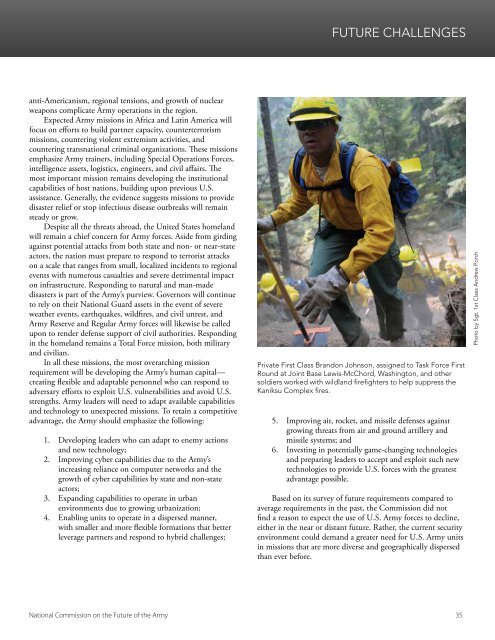THE FUTURE OF THE ARMY
Futurearmy
Futurearmy
You also want an ePaper? Increase the reach of your titles
YUMPU automatically turns print PDFs into web optimized ePapers that Google loves.
<strong>FUTURE</strong> CHALLENGES<br />
anti-Americanism, regional tensions, and growth of nuclear<br />
weapons complicate Army operations in the region.<br />
Expected Army missions in Africa and Latin America will<br />
focus on efforts to build partner capacity, counterterrorism<br />
missions, countering violent extremism activities, and<br />
countering transnational criminal organizations. These missions<br />
emphasize Army trainers, including Special Operations Forces,<br />
intelligence assets, logistics, engineers, and civil affairs. The<br />
most important mission remains developing the institutional<br />
capabilities of host nations, building upon previous U.S.<br />
assistance. Generally, the evidence suggests missions to provide<br />
disaster relief or stop infectious disease outbreaks will remain<br />
steady or grow.<br />
Despite all the threats abroad, the United States homeland<br />
will remain a chief concern for Army forces. Aside from girding<br />
against potential attacks from both state and non- or near-state<br />
actors, the nation must prepare to respond to terrorist attacks<br />
on a scale that ranges from small, localized incidents to regional<br />
events with numerous casualties and severe detrimental impact<br />
on infrastructure. Responding to natural and man-made<br />
disasters is part of the Army’s purview. Governors will continue<br />
to rely on their National Guard assets in the event of severe<br />
weather events, earthquakes, wildfires, and civil unrest, and<br />
Army Reserve and Regular Army forces will likewise be called<br />
upon to render defense support of civil authorities. Responding<br />
in the homeland remains a Total Force mission, both military<br />
and civilian.<br />
In all these missions, the most overarching mission<br />
requirement will be developing the Army’s human capital—<br />
creating flexible and adaptable personnel who can respond to<br />
adversary efforts to exploit U.S. vulnerabilities and avoid U.S.<br />
strengths. Army leaders will need to adapt available capabilities<br />
and technology to unexpected missions. To retain a competitive<br />
advantage, the Army should emphasize the following:<br />
1. Developing leaders who can adapt to enemy actions<br />
and new technology;<br />
2. Improving cyber capabilities due to the Army’s<br />
increasing reliance on computer networks and the<br />
growth of cyber capabilities by state and non-state<br />
actors;<br />
3. Expanding capabilities to operate in urban<br />
environments due to growing urbanization;<br />
4. Enabling units to operate in a dispersed manner,<br />
with smaller and more flexible formations that better<br />
leverage partners and respond to hybrid challenges;<br />
Private First Class Brandon Johnson, assigned to Task Force First<br />
Round at Joint Base Lewis-McChord, Washington, and other<br />
soldiers worked with wildland firefighters to help suppress the<br />
Kaniksu Complex fires.<br />
5. Improving air, rocket, and missile defenses against<br />
growing threats from air and ground artillery and<br />
missile systems; and<br />
6. Investing in potentially game-changing technologies<br />
and preparing leaders to accept and exploit such new<br />
technologies to provide U.S. forces with the greatest<br />
advantage possible.<br />
Based on its survey of future requirements compared to<br />
average requirements in the past, the Commission did not<br />
find a reason to expect the use of U.S. Army forces to decline,<br />
either in the near or distant future. Rather, the current security<br />
environment could demand a greater need for U.S. Army units<br />
in missions that are more diverse and geographically dispersed<br />
than ever before.<br />
Photo by Sgt. 1st Class Andrew Porch<br />
National Commission on the Future of the Army 35


